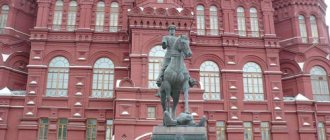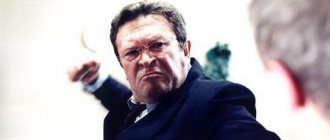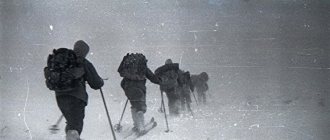Childhood and youth
On November 19 (December 1), 1896, in the village of Strelkovka in the Kaluga region, a boy was born into a peasant family, who was named Georgy. His background allowed him to receive only the simplest education - three classes at the local parochial school.
In Moscow, the boy learned to become a furrier, and by the age of thirteen he could earn his own bread. However, Gosha dreamed of continuing his education, and enrolled in evening general education courses.
With the outbreak of World War I, 19-year-old Zhukov found himself in the ranks of the tsarist army in a cavalry regiment. It is interesting that the education he received allowed the young man to go through the school of ensigns and command soldiers, but he was embarrassed to do this. If he had fought as an officer, the short biography of Marshal Zhukov would have been completely different, since after the revolution two paths awaited him: execution or emigration.
In battles, George proved himself to be a brave warrior, managed to accomplish a number of feats, but was seriously wounded and partially lost his hearing.
Date and causes of death
Figure 1. Zhukov retired
An outstanding commander, first marshal of the Soviet Union, holder of two Orders of Victory and many other awards, Georgy Zhukov died on June 18, 1974 at the age of 77 after a long illness.
The former Minister of Defense of the USSR spent the last years of his life away from the political intrigues of the Kremlin and was more immersed in the memories of his military past and the history of his country’s victories. He consulted a lot with directors working on the filming of war films, and he himself acted in documentaries dedicated to the Great Patriotic War.
At the same time, the four-time Hero of the Soviet Union is working on writing his autobiography, “Memories and Reflections.” Zhukov worked on writing his own book for more than 10 years. It was first published in 1969 and was later reprinted several times.
In 1967, Georgy Konstantinovich suffered a stroke. It took a lot of time to recover. After this, the Marshal of the USSR walked with a cane until the end of his life. And in 1973, a new misfortune - his beloved wife Galina died of cancer. The loss of a loved one seriously affected Zhukov’s health. Shortly after his wife's funeral, he had a heart attack.
After suffering an acute attack in May 1974, he fell into a coma. At this moment the patient was in the Moscow Central Clinical Hospital. There, on June 18, 1974, he died without regaining consciousness.
Great commander
During the Civil War, Zhukov went over to the side of the Red Army, fighting the detachments of Wrangel and Denikin. After graduating from the Ryazan cavalry courses in 1920, he became a platoon commander.
In the 20s, Georgy Konstantinovich began teaching at the Belarusian State University. In the 30s, he was appointed deputy commander of the Belarusian Military District for cavalry, and on the eve of the Great Patriotic War - chief of the General Staff.
At his new post, Zhukov, anticipating an attack by Germany, planned to bring the Soviet army to full combat readiness as quickly as possible. However, he failed to convince Joseph Stalin of this, which he later greatly regretted.
In the battles on the Western Front and during the breaking of the siege of Leningrad, Zhukov showed himself to be a tough, even downright cruel commander, but all his measures brought positive results. The military leader also supervised Soviet troops in the Battle of Kursk, and brilliantly carried out the offensive Operation Bagration.
Biography of Georgy Zhukov
Since 1918 in the Red Army. He served in the 4th Moscow Cavalry Regiment. Participated in the Civil War (1917-1922), fought on the Eastern, Western and Southern fronts.
In 1920 he graduated from the Ryazan cavalry courses, in 1925 - cavalry advanced training courses for cavalry command personnel, in 1930 - advanced training courses for senior command personnel.
From October 1918 to July 1923, he served as a Red Army soldier, assistant platoon commander, platoon and squadron commander, and assistant regiment commander.
In 1923-1930 he was commander of a cavalry regiment, in 1930-1931 - of a cavalry brigade.
From 1931 to 1933 - assistant inspector of the Cavalry Inspectorate of the Workers 'and Peasants' Red Army (RKKA).
In 1933-1937 he was commander of a cavalry division, in 1937-1938 - commander of a cavalry corps, in 1938-1939 - deputy commander of the Belarusian Military District for cavalry, in June - July 1939 - commander of a special corps.
From July 1939 to April 1940 - commander of the 1st Army Group of Soviet troops in Mongolia, which, together with units of the Mongolian People's Revolutionary Army, surrounded and defeated a large group of Japanese troops in the Khalkhin Gol River area.
In 1940, Georgy Zhukov was awarded the military rank of Army General.
Since June 1940, he commanded the troops of the Kyiv Special Military District.
In January - July 1941 - Chief of the General Staff - Deputy People's Commissar of Defense of the USSR.
At the beginning of the Great Patriotic War (1941-1945), from June 23, 1941, he was a member of the Headquarters of the Supreme High Command.
On July 29, 1941, Georgy Zhukov was relieved of his post as Chief of the General Staff and appointed commander of the Reserve Front forces, which carried out the first offensive operation of the war in the area of the city of Yelnya.
From September 13, 1941 he commanded the Leningrad Front.
From October 1941 to August 1942, Zhukov led the Western Front. Under his leadership, the front troops fought stubborn defensive battles, stopped the advance of German troops towards Moscow, and then, going on a counteroffensive and a general offensive in cooperation with the troops of the Kalinin Front, inflicted a major defeat on them and completely liberated the Moscow and Tula regions, many areas of the Kalinin ( now Tver) and Smolensk regions.
From February to May 1942, Georgy Zhukov was also the commander-in-chief of the Western forces. Under his leadership, troops of the Western and Kalinin fronts, during the Rzhev-Sychevsk offensive operation, eliminated the enemy's bridgehead on the left bank of the Volga in the Rzhev region.
Since August 1942 - First Deputy People's Commissar of Defense, Deputy Supreme Commander-in-Chief. In August 1942 - March 1944, Zhukov coordinated the actions of troops on a number of fronts near Stalingrad, to break the blockade of Leningrad, in the battles of Kursk and for the Dnieper, in the Zhitomir-Berdichev, Kirovograd and Korsun-Shevchenko offensive operations.
In January 1943, Zhukov was awarded the military rank of Marshal of the Soviet Union.
From March to May 1944, he simultaneously commanded the First Ukrainian Front.
From November 1944 to June 1945 he was commander of the troops of the First Belorussian Front. On behalf of and on behalf of the Soviet Supreme High Command, Georgy Zhukov accepted the surrender of the armed forces of Nazi Germany on May 8, 1945 in Karlshorst. On June 24, 1945, it hosted the Victory Parade in Moscow.
From June 1945 to March 1946 - Commander-in-Chief of the Group of Soviet Occupation Forces in Germany and head of the Soviet military administration for the management of the Soviet zone of occupied Germany.
From March to July 1946, Zhukov was Commander-in-Chief of the Ground Forces and Deputy Minister of the Armed Forces of the USSR.
From July 1946 to February 1948 he commanded the troops of the Odessa Military District. In 1948-1953 he was commander of the troops of the Ural Military District.
From March 1953 to February 1955 - First Deputy Minister of Defense of the USSR.
In 1955-1957 - Minister of Defense of the USSR. In March 1958, Georgy Zhukov was dismissed with the right to wear military uniform.
He was a deputy of the Supreme Soviet of the USSR of the 1st-4th convocations (1941-1958).
Author of the memoirs “Memories and Reflections,” which were published in more than 30 countries in 19 languages.
Georgy Zhukov - four times Hero of the Soviet Union (1939, 1944, 1945, 1956). Hero of the Mongolian People's Republic (1969). He was awarded six Orders of Lenin (1936, 1939, 1945, 1956, 1966, 1971), the Order of the October Revolution (1968), three Orders of the Red Banner (1922, 1944, 1949), two Orders of Suvorov, 1st degree (01.1943, 07.1943); twice awarded the Order of Victory (1944, 1945), was awarded the Tuvan Order of the Republic (1942), the Weapon of Honor with a golden image of the State Emblem of the USSR (1968), as well as 15 medals of the USSR and 17 orders and medals of foreign countries.
Georgy Zhukov died on June 18, 1974. The urn with his ashes is buried in the Kremlin wall on Red Square in Moscow.
In commemoration of the commander’s merits, by decree of the President of the Russian Federation of May 9, 1994, the Order and Medal of Zhukov were established, as well as the State Prize of the Russian Federation named after. Marshal of the Soviet Union G.K. Zhukova.
The name of the commander was given to the Military Command Academy of Air Defense (now the Military Academy of Aerospace Defense named after Marshal of the Soviet Union G.K. Zhukov).
The memory of Georgy Zhukov is immortalized in the names of the planet, streets in Moscow, St. Petersburg and other cities. Monuments to the commander were erected in Yekaterinburg, Omsk, Tver, Kursk and a number of other cities; his bronze bust was erected in the city of Zhukov, Kaluga Region, and a granite monument was erected in the village of Strelkovka.
In Moscow, in 1992, a bust of the commander was erected near the Kashirskaya metro station, and in 1995, a monument to him was erected on Manezhnaya Square.
In November 1996, the Memorial Office-Museum of Georgy Zhukov was opened in the “old” building of the General Staff of the Armed Forces, in the premises in which he worked as Minister of Defense of the USSR.
The material was prepared based on information from RIA Novosti and open sources
Marshal Zhukov
In 1943, Georgy Konstantinovich was awarded the title of Marshal of the Soviet Union. He became the first Soviet officer to be awarded this high rank since the beginning of the war.
After Stalin's death, Zhukov was appointed Minister of Defense. He played a decisive role in suppressing the 1956 anti-communist uprising in Hungary, organizing the bloody Operation Whirlwind.
Nikita Khrushchev, frightened by the enormous influence of the Minister of Defense, achieved the complete removal of his dangerous competitor from affairs and forced him to resign.
Marshal of Victory. The Great Patriotic War
According to eyewitnesses, Zhukov, who at the beginning of the attack on the USSR by Nazi Germany was the chief of the General Staff, was very worried that the country would not have time to prepare for the war with Hitler. He repeatedly tried to convey his thoughts on this matter to Stalin. Georgy Konstantinovich believed that it was necessary to deploy the rear as quickly as possible and redeploy the army in order to forestall the Nazis and attack first.
However, the Supreme Commander-in-Chief did not agree with his position. He considered these actions premature and was afraid of giving Hitler a reason for an accelerated declaration of war.
Having received such a decisive rebuff, Zhukov did not give up. He continued to attack the leader and finally, a few hours before the attack of Hitler's army, he and Marshal Timoshenko managed to convince Stalin to accept Directive No. 1, according to which the troops should be transferred to the highest level of combat readiness.
Stalin and Zhukov
They managed to transmit the directive by message to the combat formations, but the commanders did not have time to implement it. The Great Patriotic War has begun. The time has come for the future Marshal of Victory Georgy Konstantinovich Zhukov to prove himself to the fullest.
It is not possible to describe all of Zhukov’s military operations here, so let’s turn to the most famous of them.
Defense of Moscow. Elninsky operation and counter-offensive
The severe defeats of the Red Army from the Nazi troops and the lightning-fast advance of the enemy deep into the country during the first month of hostilities angered Stalin. He came to the conclusion that the Chief of the General Staff was not able to correctly assess the situation at the fronts and was making deliberately erroneous decisions. Therefore, he removed Zhukov from this position and placed him in command of the Reserve Front. This was the most difficult section - near Moscow, where our army suffered defeat after defeat.
Georgy Zhukov on the Reserve Front
Contrary to expectations, the new commander managed to level out the situation in the entrusted area. He carried out the successful Yelnya operation, when, as a result, Soviet troops liberated the only settlement in the entire 1941 - Yelnya. And, although the goal was not fully achieved - the Nazis managed to withdraw the main forces from the attack under cover of bad weather, the operation made it possible to consolidate local success.
Subsequently, in the winter of 1941, under the command of Zhukov, a counter-offensive was carried out, as a result of which it was possible to push back enemy troops more than 100 km from Moscow and keep them there for two years. Thus, the main danger was diverted from Moscow.
Elninskaya operation
Defense of Leningrad
Seeing that the commander of the Reserve Front brilliantly coped with the task assigned to him, Stalin transferred Zhukov to another no less difficult sector - to command the Leningrad Front.
The situation was truly critical - a blockade ring had closed around Leningrad, there were not enough forces and means, and there was nowhere to wait for reserves. The Germans pressed our troops, intending to break through further and connect with the Finns. This would complete the destruction of the cradle of three revolutions. The defense of Leningrad with such a development of events would have been a failure.
Zhukov’s toughness, for which he was often criticized, came in handy in this situation. He brought to life Stalin’s famous call “Not a step back!”, and it bore fruit.
Zhukov and the defense of Leningrad
Under the threat of extreme measures, the fighters stopped retreating and leaving positions without orders. Our forces were not enough for a counteroffensive and other active military operations, but the situation on the line of contact was stabilized. The enemy was unable to get any closer to Lenin's city and thus limited the damage he was able to inflict. The advance of Army Group North, which is attacking Leningrad, has stalled. The plans of the enemy command were once again thwarted.
Rzhev-Vyazemsk operation
The controversy surrounding this operation continues to this day. some consider it a genius, others – a failure and meaningless. However, it is always easier to judge after the fact than while in the thick of things.
So, the local victories of the Red Army encouraged everyone - both fighters and commanders. The military leaders had no doubt about further success if the offensive against the enemy developed. And they began to actively develop it. Probably, it was necessary to take into account that the German troops were still strong, and the front line was very stretched. Perhaps it was worth thinking about the superiority of the military equipment of the German fascists. In addition, there was a significant shortage of competent commanders - many officers died in the first months of the war.
Be that as it may, in 1942, the advance of the Red Army first slowed down and then reversed. The Wehrmacht command again seized the initiative and drove our units deeper into the country.
Rzhev-Vyazemsk operation of 1942
Objectively speaking, in such conditions the possibility of any successful military operations was very doubtful. And during this period of the Great Patriotic War, Zhukov carried out the sensational Rzhev-Vyazma operation.
The losses during its implementation were colossal - about 800 thousand people, this is two-thirds of the total personnel. This is a severe blow to the combat potential of the troops. But the operation itself shackled the hands of the German army and, in addition, pulled part of the forces away from Stalingrad. Bogged down near Rzhev, Hitler was unable to send reinforcements to Paulus’s army.
Battle of Kursk
The Battle of the Kursk Salient or Operation Citadel is perhaps one of the most significant during the Great Patriotic War. It was the victory that marked a radical turning point, after which the initiative finally passed to the Soviet command.
Before the Battle of Kursk, G.K. Zhukov became the first marshal of the Soviet Union since the beginning of the war. In this rank, he was sent by a representative of the Headquarters of the Supreme High Command of the USSR to the Kursk salient. The Battle of Kursk began on July 5.
It is also famous for the largest tank battle in military history. More than 1,200 combat vehicles from both sides took part.
The victory also had great moral meaning. The Soviet troops, inspired by this turn of events, perked up and believed in the imminent destruction of the “brown plague.” After the Kursk Bulge, our army began to win victory after victory.
Battle of Stalingrad
Zhukov did not lead the entire battle from beginning to end. He took part as a representative of the Supreme Command Headquarters in only one of its components - the operation called “Mars”.
Its goal was to encircle and destroy the 9th Nazi field army, and Zhukov coordinated this process. The outcome of this battle was unsuccessful - the goal could not be achieved, and the losses were colossal (215 thousand personnel and 1315 tanks and self-propelled guns).
Zhukov at the Battle of Stalingrad
However, Operation Mars cannot be called a complete failure. Having tied up the Germans in the center, Zhukov prevented the transfer of part of the forces to the south, where additional reserves could significantly worsen the situation at Stalingrad. Perhaps his actions ultimately helped to achieve the defeat of the Nazis in this direction.
Operation Bagration
Took place in 1944. It marked the complete liberation of Belarus from the Nazi invaders. Zhukov was the main coordinator of this operation. It was one of the largest during the war and was developed by several military leaders. According to the plan, 5 fronts took part in it - the 1st, 2nd and 3rd Belorussian, 1st Ukrainian and 1st Baltic. The total number of troops was more than 1.2 million people. The superiority over the German armies was more than twofold.
The directions of the main attacks were developed by Marshal Rokossovsky, under whose command the 1st Belorussian Front was located. A symbolic date was chosen for the start of the offensive - June 22. Our leadership wanted to take revenge from the fascists.
Rokossovsky and Zhukov before Operation Bagration
The operation ended very successfully; the leadership of the Red Army did not even expect such significant results. The enemy was thrown back twice as far as originally planned. Belarus was cleared of invaders by August 29, 1944.
It is significant that the operation ended in the same place where the Great Patriotic War began - in Brest. The fascist armed forces were seriously undermined. But this was not the end.
Berlin offensive operation
This is perhaps the most important triumph of the entire career of commander Zhukov. As an apogee - his signature above the signature of Field Marshal Keitel in the act of unconditional surrender of the Third Reich.
The key moment of the entire operation was the capture of the Seelow Heights. Firstly, the Germans had three defense lines (rings) there and, secondly, these heights dominated the area. Whoever owned them controlled the entire situation. Taking Berlin without the Seelow Heights was unthinkable.
Assault on the Seelow Heights
During the Berlin operation, Zhukov commanded the 1st Belorussian Front. Under his skillful leadership, the treacherous heights were occupied by Soviet troops.
In addition, the offensive actions of the Red Army were supposed to prevent the withdrawal of fascist troops from the “bag” in a western direction - to the place of deployment of the Allied armed forces. If the Germans had managed to surrender to them, there was a real possibility that the Allies could declare themselves victorious, setting aside all the efforts of the Soviet Union.
That is why the battle for Berlin was so bloody - both sides fought to the death. The Germans were afraid to surrender to Soviet Russia and therefore literally gnawed their way out of retreat towards Anglo-American negotiations, hoping for more favorable terms of surrender. In turn, the Soviet command also understood this and threw in all their strength and resources in order to take the fascist capital before the Nazi leadership was able to come to an agreement with the allies.
Marshal of the Soviet Union Georgy Zhukov during the Berlin operation
As a result of the fiercest battle, the stubborn resistance of the Wehrmacht army was broken by the 1st Belorussian Front, and Zhukov officially became the Marshal of Victory. The Berlin garrison surrendered to our troops on May 2, 1945, and on May 9, in a solemn ceremony, the great commander Georgy Konstantinovich Zhukov accepted the surrender of Nazi Germany.
The Great Patriotic War was over. It is impossible to overestimate the role of Marshal of the Soviet Union Georgy Zhukov. He will forever remain a folk hero, a national treasure of our country.
Personal life
Zhukov's first wife was the young teacher Alexandra Zuikova, with whom he began living in 1920, although they officially married only 33 years later. She gave her husband two daughters - Era and Ella.
During this period, Zhukov had another daughter, Margarita, from a relationship with Maria Volokhova, with whom he was in love in his youth.
During the war, Zhukov’s common-law wife was paramedic Lydia Zakharova, who went through all the hardships of the war years with him.
The marshal's last love was Galina Semenova, for whose sake he divorced his official wife. In 1965, he married Galina, and became a father for the fourth time - the couple had a daughter, Maria.
Zhukov was able to become a diligent father for his children - he gave all his daughters an excellent education and helped as much as he could.
Death of the Grand Marshal
Georgy Konstantinovich died of a heart attack, which followed 8 months after his beloved wife passed away. He died in the Kremlin hospital without leaving a coma. The date of death of the victorious marshal was June 18, 1974.
He was buried in the same place where most prominent people - the extracropolis of the Kremlin wall. Although, according to the recollections of his daughter Era, his father asked to be buried in a grave like an ordinary person. He wanted to rest in the ground, and not be walled up in a wall. But his ashes belonged not only to the family, but to the whole country, so the USSR leadership did not listen to the marshal’s relatives.
The great commander lives both in the memory of the whole country and in the hearts of his relatives and friends. They carefully preserve his portrait and photographs, which depict important moments of Zhukov’s life, so that over time they can pass on this priceless heritage to their grandchildren - the descendants of the legendary marshal.
Zhukov's orders and medals are kept in the Museum of the Armed Forces, where anyone can touch the history of the hero.
Victorious Marshal Georgy Konstantinovich Zhukov
Zhukov and Stalingrad
On August 27, 1942, Stalin told Zhukov: “It may happen that the Germans will take Stalingrad,” and he decided to send Zhukov to straighten things out. Georgy Konstantinovich understood perfectly well that he was sent to the most critical sector of the Soviet-German front, where the decisive battle took place. The German 6th Army, the best in the Wehrmacht, was approaching Stalingrad.
, Army General G.K. Zhukov,
arrived in the Stalingrad area. Under the leadership of G.K. Zhukov, a fierce battle on the outskirts and in the city lasted more than 3 months. The heroism of the soldiers and commanders who defended the city will not fade for centuries.
On November 19, our troops struck the enemy flanks under the thunder of artillery cannonade. With stubborn fighting, they broke through the enemy's defenses and rushed towards each other. At 16:00 on November 23, German troops in Stalingrad and near the city were surrounded. On the morning of November 24, in pursuance of orders from Headquarters, they began to destroy them. The ring of Paulus’s group, which was surrounded, began to methodically shrink. On February 2, 1943, the remnants of the 330,000-strong German group capitulated. “The battle in the Stalingrad area,” wrote G.K. Zhukov, “was exceptionally fierce. Personally, I compare it only with the battle of Moscow. The total losses of enemy troops in the Don, Volga, and Stalingrad areas amounted to about 1.5 million people, up to 3,500 tanks and assault guns, 12,000 guns and mortars, up to 3,000 aircraft and a large amount of other equipment.” The victory of the Red Army on the Volga made a decisive contribution to achieving a radical turning point in the Great Patriotic War.
Figure of Marshal Zhukov
Through trial and error, the Soviet Union built the foundation for the implementation of the idea of the common good. The cost of mistakes was measured in millions of human lives. In the new state, values changed and new heroes were born.
Georgy Konstantinovich in his youth
Georgy Zhukov is a product of the Soviet military system. At critical moments in history, he changed the course of events. His authority was so strong that it harmed himself. He went through all the levels of the military hierarchy, but could not stand up in the political struggle. Unexpected turns happened in his life when it seemed that all the worst things had passed.
Zhukov - the beginning of the journey
On August 7, 1915, Zhukov was drafted into the dragoon regiment. In his declining years, Marshal told the writer Konstantin Simonov: “I could have ended up in a school for warrant officers. I graduated from a four-year school on Gazetny Lane, which provided a sufficient educational qualification for admission to this school. But I thought: I’ll graduate from ensign school and, as a 19-year-old boy, I’ll command experienced soldiers—bearded men. I didn't want this, it was awkward. And who knows what would have happened if I had turned out not to be a soldier, but an officer... and by that time a revolution would have broken out... Maybe I would have lived out my life somewhere in exile? " Therefore, Georgy Konstantinovich entered the non-commissioned officer school, which he graduated from in August 1916.
Georgy Konstantinovich Zhukov Drafted into the army on August 7, 1915
Junior non-commissioned officer Zhukov fought bravely, but not for long. In September, he was slightly wounded during a cavalry attack on the Southwestern Front, in the mountainous region of Bystrica, and received the St. George Cross for capturing the tongue. But already in October, Georgy Konstantinovich was blown up by a mine and received a severe concussion. It took a long time to undergo treatment. Zhukov never returned to the front.
Georgy Konstantinovich met the February Revolution in the marching squadron. He was sympathetic to the overthrow of the monarchy. Zhukov was elected chairman of the squadron committee and member of the regimental council. After the October Revolution, his squadron stationed in the Kharkov province “took up the platform of the Bolsheviks,” refused to submit to the Ukrainian authorities and was disbanded to their homes. In December 1917, Zhukov left for his homeland, Strelkovka - it was easier to feed himself in the village. In September 1918 he was mobilized into the Red Army. The future commander Zhukov served in the 4th Moscow Cavalry Regiment. There he rose to the rank of assistant platoon commander and in March 1919 joined the Communist Party. He fought against the Ural Cossacks and with the army of General P. N. Wrangel near Tsaritsyn, where in October 1919 he was wounded by a grenade fragment in his left leg and left side. After recovery, he attended the Ryazan cavalry courses. In August, the cadet regiment was transferred to Kuban to fight the landing of General Sergei Ulagai. Zhukov became a platoon sergeant major and participated in the “cleansing” of the North Caucasus from the remnants of the White Army and “green” detachments. At the end of the year, he went to suppress the uprisings in the Tambov region and in the Voronezh province. For successful actions, squadron commander Zhukov received the first Soviet award - the Order of the Red Banner.
Childhood
The future commander was born in 1896 in the Kaluga province and became the second child of already middle-aged villagers.
At that time, father Konstantin Artemyevich was 52 years old, and mother Ustinya Artemyevna was 37 years old. This was the second marriage for both spouses. The head of the family was engaged in shoemaking, and his wife was engaged in housework, in the field, and also in transporting various loads by horse. Egorka (as Georgy’s family was called) had an older sister, Masha, who was 2 years older, and 5 years later he had a brother, Alyosha, who died a year later. At the age of 11, he was sent to study fur art in the Mother See, where his uncle, the owner of a furrier’s workshop and shop, lived. At the same time (with the help of his cousin) Georgy improved his mathematics, literature, geography and even mastered the German language. A year later, he enrolled in evening courses providing general education, and successfully completed them.
Study and career of Georgy Zhukov At the age of 15, he received leave and went to visit his parents, and when a fire broke out nearby, he carried an elderly woman and small children out of a burning house. After that, for his courage and education, his fellow villagers began to call him by his first name and patronymic.
Career
After the end of the Civil War, Zhukov commanded a squadron, then a regiment, and from 1930 already a brigade.
The talented commander had a successful career. In 1939, Georgy already commanded a group of Soviet troops in Mongolia. Together with his Mongol comrades, Zhukov smashed the presumptuous samurai near Khalkhin Gol. A year later, the senior command staff again began to be awarded the ranks of general, which had been abolished after the revolution. Zhukov became an army general. Stalin invited the hero of Khalkhin Gol to the Kremlin, where he appointed him commander of the Kyiv district. The general set out to take up his new position with a heavy heart - it was clear that war was just around the corner.
The day after the start of the war, the Headquarters of the Main Command was created, which included Zhukov. First, he managed to carry out the first successful offensive operation near Yelnya. Then the general was entrusted with the defense of Leningrad. There he ordered to shoot everyone who retreats without orders. In ciphergram No. 4976 dated September 28, 1941, Georgy Zhukov wrote: “Explain to all personnel that all families of those who surrendered to the enemy will be shot.”











